Why are coffee grounds good for cannabis?
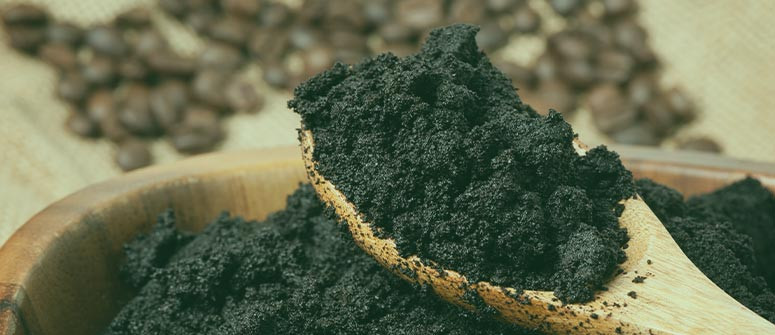
Heard rumours about the benefits of gardening with coffee grounds? Well, they're true (at least to some extent). Learn all about the advantages of using coffee grounds to grow cannabis and keep pests (and pets) out of your garden!
Contents:
- What are coffee grounds?
- Why should you use coffee grounds for cannabis?
- How to use coffee grounds in your cannabis garden
- Beware: “Too much of a good thing” applies to growing marijuana with coffee grounds
- What kind of coffee grounds work best for the cannabis plant?
- Where and how to store coffee grounds
- Coffee grounds for cannabis plants: Soil amendment, pest control, fertiliser and more
Hold on to your coffee grounds! Rather than throw the used grounds from your coffee maker out with the trash, save and use them in your cannabis garden! Whether used as fertiliser, an amendment to your compost pile, or even to repel certain pesky pests, keep reading for a detailed look at the benefits of coffee grounds for cannabis plants.
What are coffee grounds?
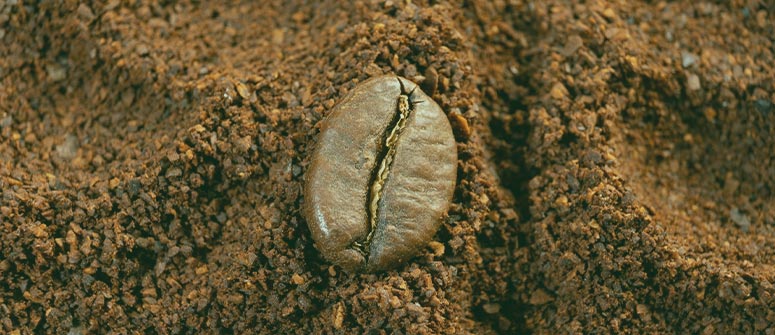
Before we get stuck into the nitty-gritty of using coffee grounds to grow weed, let's ensure we're all on the same page. When we refer to coffee grounds, we mean the moist, black coffee grounds you're left with after preparing a fresh cup of joe. While they might no longer serve the purpose of brewing coffee, these leftover grounds will work wonders in your garden. So, brew yourself a cup of cannabis-infused coffee, and learn why and how to use coffee grounds in the garden.
Why should you use coffee grounds for cannabis?
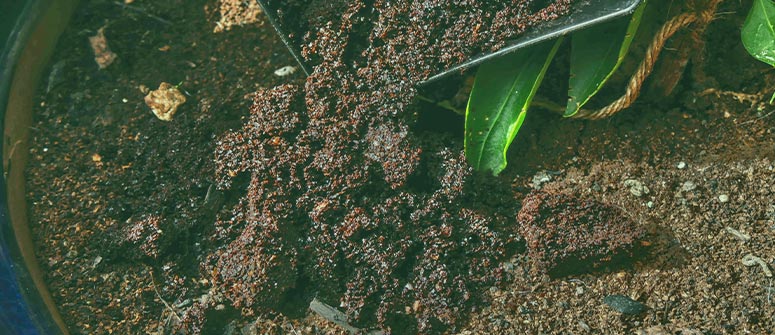
Coffee grounds have many potential benefits for gardens and grow rooms: since the grounds still contain considerable amounts of nitrogen, phosphorus, and potassium, they can be used to make your own fertiliser in a few simple steps.
Alternatively, you can add coffee grounds to compost, where they'll provide those same nutrients to your final compost mix. Plus, they can also be used to amend soil, control pests, and kill weeds!
Note: while coffee grounds make a great addition to your gardening practice, they're far from a cure-all for nutrient deficiencies, poor soil, or pest infestations. They do, however, make a great addition to an already well-maintained garden, helping to solidify the environment so your plants can grow to their full potential.
Coffee grounds as a fertiliser
Besides caffeine, coffee contains a wide variety of nutrients and minerals, including nitrogen, potassium, phosphorus, calcium, and magnesium. One simple way to harness those leftover minerals in your used coffee is to turn your grounds into a fertiliser. There are essentially two ways to do this:
- By soaking dry coffee grounds in unchlorinated water to make a liquid fertiliser (directions further below).
- By mixing dried coffee grounds into your soil, where they'll provide a slow release of nutrients as they decompose.
Coffee grounds in compost and as worm food
If you're composting at home, adding coffee grounds to your vermicompost is a great way to reduce waste, feed your worms, and remove any leftover caffeine or tannins from your spent grounds before feeding your plants.
While some gardeners also claim that coffee grounds help to increase the number of worms in your compost, there is no substantial scientific research to support this. Some studies have found that adding coffee grounds to compost may impact the biomass of worms,¹ while others have found no such correlation.² Research does show, however, that composting coffee grounds undoubtedly improves the quality of finished compost, enriching it with nutrients and eliminating toxins such as tannins and caffeine, which may be harmful to plants.³
Note: coffee grounds contain small amounts of tannins and caffeine, and their acidity may also impact soil pH. Composting grounds first, before adding them to your plants’ soil, can help to remove these compounds, which, in high concentrations, can be damaging to your weed crop.
Coffee grounds as a pest deterrent
Besides working as a fertiliser and compost ingredient, you might be surprised to learn that coffee grounds can help to control some pests in your garden. Thanks to their caffeine content, the grounds can effectively deter and even kill slugs and snails.⁴
Some gardeners also claim that the smell of coffee grounds deters bees and wasps—something we do not recommend, as bees and wasps are important pollinators, and attracting them to your garden is a huge plus for you and the environment.
Do coffee grounds kill ants?
The internet is full of articles claiming that coffee grounds can kill and deter ants. Most recommend placing coffee grounds directly on anthills, on ant paths, or around the base of plants. However, there isn't much research to show that this actually works. A small study by Texas AgriLife Extension, for example, found that placing coffee grounds on a fire ant hill didn't kill the insects nor impact their activity in any substantial way.⁵
Other experiments found online appear to corroborate these results. While ants definitely don't like coffee (they'll actively avoid walking on it at first), they usually have no problem finding ways around the grounds if they really need to.
Do coffee grounds deter cats?
While cats don't feed off marijuana plants like many pest insects do, they love to burrow, defecate, and urinate in soil. Their burrowing can disturb and damage the roots of plants, while their urine and faeces can be toxic and even attract harmful bacteria and fungi into your garden. Luckily, many gardeners report that the strong smell of coffee grounds can help deter cats from garden beds and potted plants.
Coffee grounds as a soil amendment
While it might sound unusual, mixing coffee grounds directly into your soil mix works like a charm. Thanks to their fine texture, dried coffee grounds can help to lighten up dense soil mixes, leaving them well-aerated, which not only improves drainage but also promotes the growth of healthy roots. And as if that wasn't enough, coffee grounds also help to support the microbial life in your soil by providing organic matter that feeds microbial life forms such as beneficial bacteria and fungi.
Do coffee grounds affect soil pH?
Yes, but not as much as you might think. Coffee grounds have a pH of roughly 6.5–6.8, which is right in the sweet spot for cannabis. Therefore, using coffee grounds as a soil amendment may help to make alkaline soil more acidic, but likely only when used in larger amounts (which we do not recommend).
Will coffee grounds kill weeds?
Yes, spent coffee grounds make for a great natural weed killer. Studies show that coffee grounds have allelopathic properties (meaning they can reduce the competition between different plant species),⁶ which likely comes from the trace amounts of caffeine they contain. In fact, coffee seeds are believed to contain caffeine for the very purpose of suppressing the germination of seeds of other plant species.⁷
How to use coffee grounds in your cannabis garden
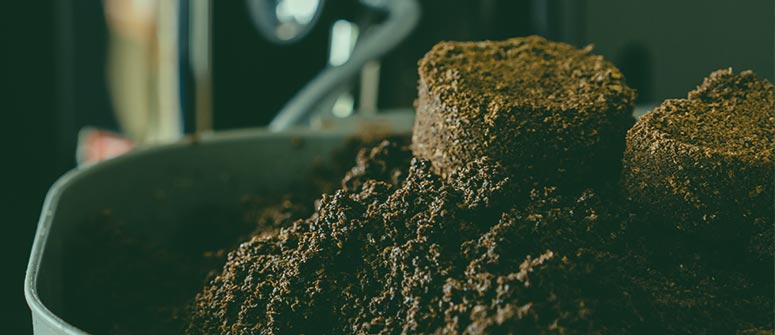
Now that you understand the benefits of coffee grounds for cannabis, here are a few simple ways you can harness those benefits and start using coffee grounds in your cannabis garden today:
- Make a liquid fertiliser. Mix 2 small cups of coffee grounds with 5l of unchlorinated water. Let the water sit overnight, stir it, and drain the mixture to remove the coffee grounds. The remaining liquid will contain some of the nutrients we mentioned earlier and can be used just like any other liquid fertiliser. Note that this kind of coffee fertiliser is very mild, so you won't need to dilute it or otherwise worry about overfeeding your plants. Simply use it to water plants as you would normally.
- Lightly sprinkle small amounts of well-dried coffee grounds on top of your soil, and use a rake to gently incorporate the grounds into the topsoil. The grounds will serve as food for microbial life forms in your soil and, as they decompose, will also release nutrients into the soil for your plants.
- Mix small amounts of coffee grounds into your soil as you prepare it prior to growing. As mentioned earlier, using small amounts of dried coffee grounds in your soil mix can help to create a light, airy growing medium that supports healthy roots and water drainage. While there's no exact science to this, using ½–1 cup (125–250g) of dried grounds per 10l of soil is likely a good starting point.
- Use more generous amounts of coffee grounds to create mounds around the base of your plants to deter pests and cats. Be careful no to use too much, though, as coffee grounds can clump together and affect the penetration of water into the soil.
Can coffee grounds treat nitrogen or phosphorus deficiency?
While coffee grounds make for good natural fertiliser, they shouldn't be your first line of defence against a nutrient deficiency. Coffee grounds typically have an NPK of roughly 2:0.3:0.3, which is fairly mild. Plus, the nutrients contained in coffee grounds aren't readily available to your plants. Like other organic matter, coffee grounds need to be broken down by soil microbes or other organisms in order for their nutrients to be accessible to your plants.
When faced with a nutrient deficiency, you'll want to resolve the matter quickly to avoid stunted plant growth and more serious problems. In most cases, nutrient deficiencies are the result of "nutrient lockout" caused by a pH issue, salt buildup, or fungal problem. If you're noticing signs of a deficiency in your plants, coffee grounds won't directly address any of these underlying issues.
Beware: “Too much of a good thing” applies to growing marijuana with coffee grounds
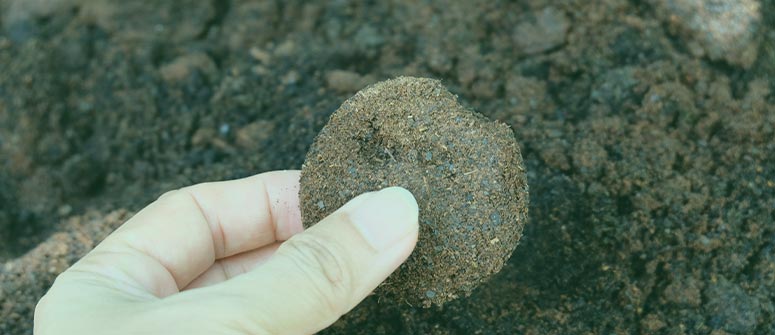
As with many aspects of gardening, the "too much of a good thing" rule applies to using coffee grounds. While they work as a fertiliser, soil amendment, and pest/weed-control method, overusing coffee grounds can have negative effects on your plants. Here are a few things to avoid when using coffee grounds in your garden:
- Don't use coffee grounds as mulch: When used in excess and without being incorporated into the soil properly, coffee grounds can form a thick, hard layer that prevents the proper flow of water into your growing medium.
- Don't mix too many coffee grounds into your soil: As mentioned above, coffee grounds contain caffeine and tannins that can suppress the growth of some plants.
- Don't use coffee grounds on seedlings: Due to their allelopathic properties, coffee grounds may interfere with the germination and rooting of your seedlings. Only use coffee grounds in small amounts in the soil of plants that have already developed a strong root system.
What kind of coffee grounds work best for the cannabis plant?
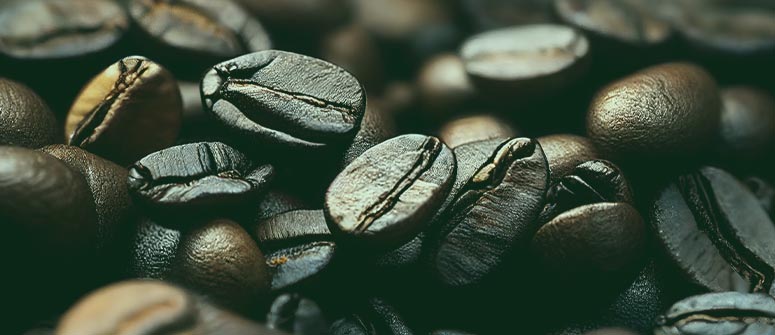
Freshly ground whole bean coffee is what you'll want to use in your garden (instant coffee is made by freeze-drying liquid coffee extract and doesn't contain any actual coffee beans, so we don't recommend using it on your plants). You can use the coffee grounds from your coffee machine at home or source them from a local coffee shop—most specialty shops now happily give away their spent grounds to customers, usually free of charge! Wherever you source your coffee grounds, make sure they're fresh and free of mould to avoid introducing harmful bacteria and fungi into your cannabis garden.
Where and how to store coffee grounds
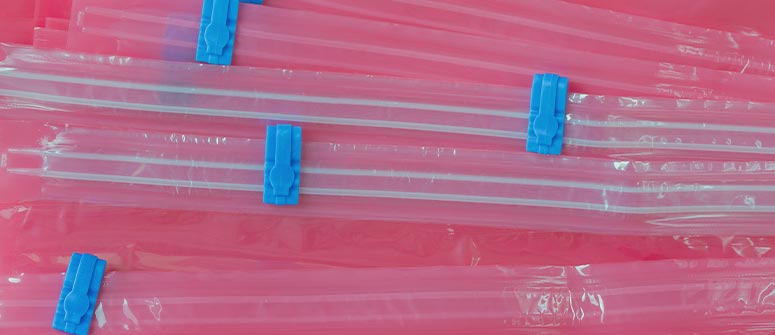
To store your coffee grounds, first dry them completely (either in the sun or in a warm oven) before packing the dried grounds into an airtight container (zip-lock bags, glass jars, or any other kind of clean, sealable container works great). Store the dried grounds in the fridge to keep them from getting mouldy.
While some sources claim that coffee grounds can keep for years if dried and stored properly, we wouldn't recommend storing them for more than 1 week in the fridge to avoid the growth of bacteria and mould. Alternatively, if you don't plan to use your spent grounds right away, consider storing them in the freezer, where they should keep for several months.
Can coffee grounds go bad?
Definitely! Coffee grounds can get mouldy very quickly if stored wet and in warm conditions. That's why it's important to ensure your grounds are well-dried and stored in dry, cool conditions in the fridge. Before using your coffee grounds in the garden, make sure to inspect them for mould, and smell them; they should have a nice coffee aroma—any musky or off-putting aromas could be a sign that your coffee grounds have gone bad.
Coffee grounds for cannabis plants: Soil amendment, pest control, fertiliser and more
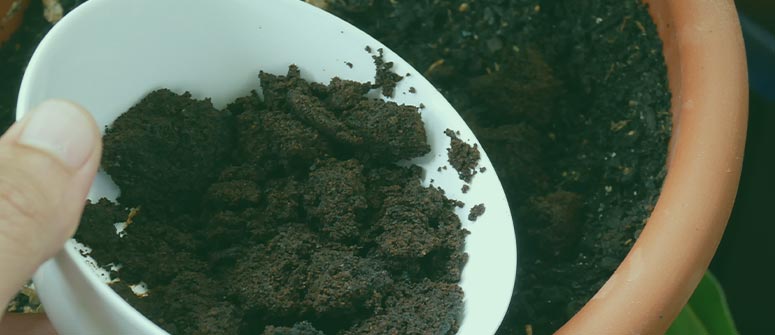
Coffee grounds are arguably one of the most underrated sources of nutrients for cannabis plants, and can be applied in small amounts without disrupting the progress of your garden. On the contrary, these tiny grounds can give a substantial boost to plants when used as a soil amendment and liquid fertiliser. This, alongside use as a pest and pet-control method, makes coffee grounds a no-brainer in any garden. With the help of this guide, you can be well on your way to turning your morning cup of joe into a thriving garden of healthy marijuana plants. Now, use that caffeine buzz to get your grow started today!
References:
1. Adi A, Noor Z. Waste recycling: utilization of coffee grounds and kitchen waste in vermicomposting. Bioresource Technology. 2009 Jan;100(2):1027-1030. https://pubmed.ncbi.nlm.nih.gov/18752936/
2. Fink S, Hong L, Morrison I, Wong Y.The Effects of Varying Coffee Ground Amounts on earthworm Eisenia fetida Biomass in Vermicomposting. 2012. https://deepblue.lib.umich.edu/bitstream/handle/2027.42/96207/Fink_Hong_Morrison_Wang_2012.pdf?sequence=1
3. Cátia S, Fonseca J, Aires A, Coutinho J, Trindade H. Effect of different rates of spent coffee grounds (SCG) on composting process, gaseous emissions and quality of end-product. Waste Management. 2017 Jan;59:37-47. https://pubmed.ncbi.nlm.nih.gov/28340969/
4. Whitfield, J. Coffee Breaks Slugs. Nature. 2002. https://www.nature.com/articles/news020624-8#citeas
5. William, R. Entomologist testing puts bite on many ‘home’ fire ant treatments. texas Imported Fire Ant Research and Management Project blog. January 7, 2012. Accessed October 3, 2022. https://fireant.tamu.edu/entomologist-testing-puts-bite-on-many-home-fire-ant-treatments/
6. De Melo B et al. Allelopathic Effect of the Coffee Residue in Emergency and Urochloa brizantha Growth. American Journal of Plant Sciences. 2018 09(04):637-644. https://www.researchgate.net/publication/323661957_Allelopathic_Effect_of_the_Coffee_Residue_in_Emergency_and_Urochloa_brizantha_Growth
7. Wong J. Gardens: so you think coffee grounds are good for plants. The Guardian. October 23, 2016. Accessed October 3, 2022. https://www.theguardian.com/lifeandstyle/2016/oct/23/coffee-grounds-are-not-good-for-plants-its-a-myth




